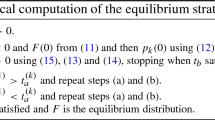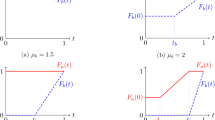Abstract
We use a single-server queueing model, with limited waiting room capacity, to model a situation where the manager of a facility tries to maximize the profit generated by the facility. He advertises to attract customers. The effectiveness of advertising may depend on the reputation of the facility, which is measured by the fraction of customers who balk. We assume Poisson arrivals and allow Erlang service times to study how the variance of service times affects the optimal policy, both when the efficiency of advertising is exogenous, and when it is a function of the balking rate. We conclude that the optimal policies are similar for deterministic service times, but diverge as the variance of the service time increases.
Similar content being viewed by others
Author information
Authors and Affiliations
Rights and permissions
About this article
Cite this article
Ackere, A., Ninios, P. Simulation and Queueing Theory Applied to a Single-Server Queue with Advertising and Balking. J Oper Res Soc 44, 407–414 (1993). https://doi.org/10.1057/jors.1993.70
Published:
Issue Date:
DOI: https://doi.org/10.1057/jors.1993.70




